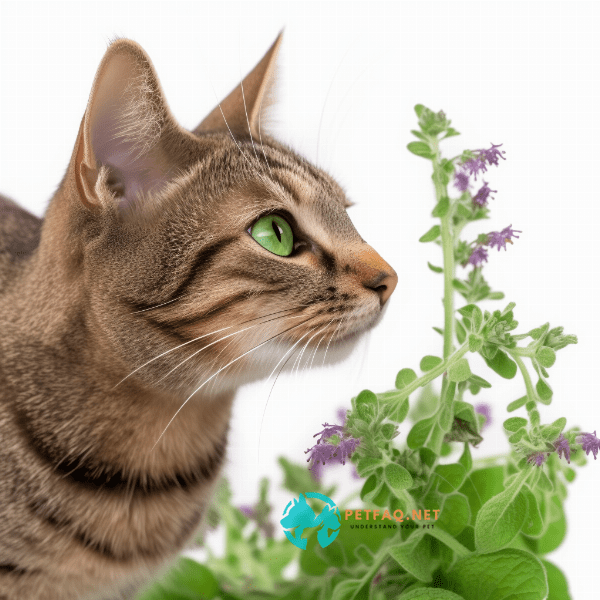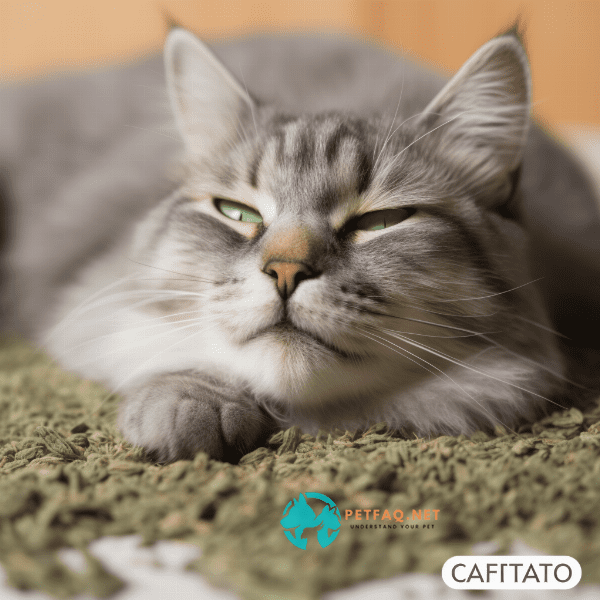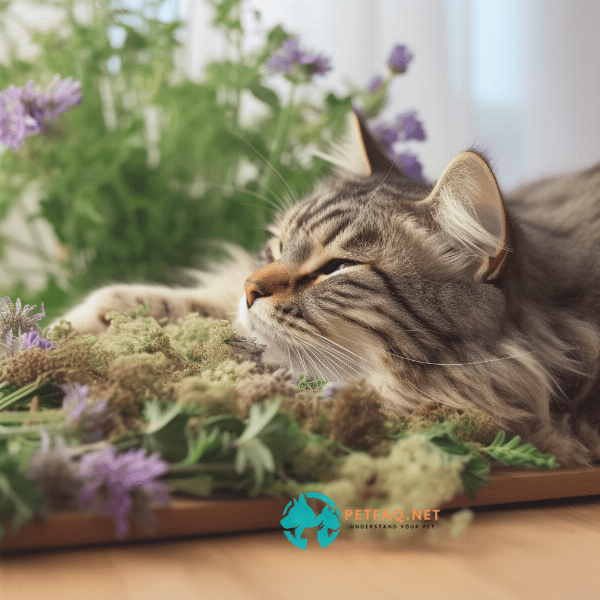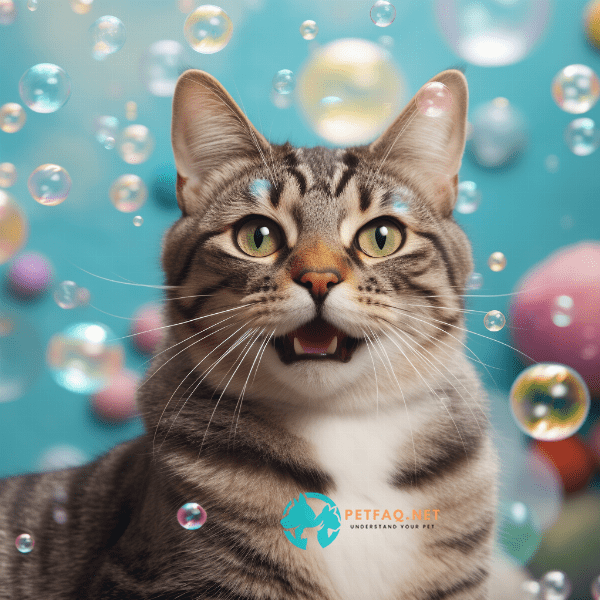Table of Contents
What is catnip and how does it affect cats?
Catnip, also known as Nepeta cataria, is a type of herb that is a member of the mint family. It contains a chemical compound called nepetalactone, which is what gives it its characteristic scent and affects cats in particular.
When cats smell or ingest catnip, they often display a range of behaviors such as rolling around, rubbing their faces, and even becoming more playful or hyperactive. These behaviors can be explained by the effect that nepetalactone has on a cat’s brain.
Specifically, nepetalactone binds to receptors in a cat’s olfactory bulb, which is responsible for processing smells. From there, it travels to the amygdala and hypothalamus, which are areas of the brain that regulate emotional and behavioral responses. The result is often a sense of euphoria or pleasure in the cat, which can lead to the playful and sometimes silly behavior that many cat owners associate with catnip.
However, not all cats are affected by catnip. In fact, only around two-thirds of cats have a genetic predisposition to respond to it. Additionally, the effects of catnip tend to be short-lived, usually lasting only a few minutes before wearing off.
Overall, catnip is a safe and natural way to provide enrichment and stimulation for cats, but it’s important to remember that not all cats will be interested in it and that it’s not a substitute for proper sleep and rest.

Can catnip help or hinder your cat’s sleep?
The effects of catnip on a cat’s sleep are somewhat controversial. While some experts believe that catnip can actually help cats to relax and fall asleep more easily, others suggest that it may have the opposite effect and make cats more active and alert.
One reason for this discrepancy is that the effects of catnip can vary depending on the individual cat and the amount consumed. In some cats, a small amount of catnip may have a sedative effect, while in others, it may make them more playful and energetic.
Another factor to consider is the timing of catnip use. If given in the evening or before bedtime, catnip may actually promote relaxation and help your cat to wind down for the night. However, if given during the day or when your cat is already feeling alert, it may have the opposite effect and make them more active.
Overall, the effects of catnip on sleep are somewhat unpredictable and may vary from cat to cat. If you’re concerned about the impact of catnip on your cat’s sleep, it’s a good idea to monitor their behavior after using it and adjust your usage accordingly. As with any supplement or herb, it’s also important to speak with your veterinarian before introducing catnip into your cat’s routine.

The science of cat sleep: How catnip affects feline sleep patterns
Cats are known for their love of sleeping, with adult cats sleeping an average of 12-16 hours a day. However, the quality of their sleep can be just as important as the quantity. Understanding the science of cat sleep can help you to better understand how catnip may affect your cat’s sleep patterns.
Cats have a unique sleep cycle that is divided into two main stages: Rapid Eye Movement (REM) sleep and Non-Rapid Eye Movement (NREM) sleep. During NREM sleep, cats experience a state of deep relaxation, while REM sleep is characterized by more active brain activity and dreaming.
Research has shown that catnip can affect both stages of a cat’s sleep cycle. While small doses of catnip may help to promote relaxation and deeper NREM sleep, larger doses may lead to more REM sleep and increased activity during sleep.
It’s also worth noting that catnip can affect cats differently depending on their age and overall health. Older cats may be more sensitive to the effects of catnip, while cats with medical conditions or on medication may have altered sleep patterns that make the effects of catnip less predictable.
Overall, the science of cat sleep is complex and varies from cat to cat. If you’re considering using catnip to help your cat sleep, it’s important to monitor their behavior and consult with your veterinarian to ensure that it’s safe and appropriate for your cat’s unique needs.

Tips for using catnip to promote better sleep in your cat
If you’re interested in using catnip to promote better sleep in your cat, there are a few tips to keep in mind to ensure that it’s used safely and effectively. Here are some tips for using catnip to promote better sleep in your cat:
1. Use a small amount: When introducing your cat to catnip, start with a small amount and gradually increase the amount over time. This will help you to gauge your cat’s response and prevent overstimulation.
2. Timing is key: If you’re using catnip to promote better sleep, give it to your cat in the evening or before bedtime. This will help to promote relaxation and prepare your cat for sleep.
3. Use quality catnip: Not all catnip is created equal. Look for high-quality, organic catnip to ensure that it’s safe and effective for your cat.
4. Use a variety of enrichment activities: While catnip can be a fun and enriching activity for your cat, it’s important to provide a variety of other enrichment activities as well, such as toys, scratching posts, and playtime with their owner.
5. Consult with your veterinarian: If you have any concerns about using catnip with your cat, it’s always a good idea to consult with your veterinarian. They can help you to determine if catnip is safe and appropriate for your cat’s unique needs.
By following these tips, you can use catnip to promote better sleep and relaxation in your cat in a safe and effective way.

Alternatives to catnip for helping your cat sleep better
While catnip can be a helpful tool for promoting better sleep in cats, it’s not the only option available. Here are some alternatives to catnip for helping your cat sleep better:
2. Chamomile: Chamomile is another herb that can help to promote relaxation and reduce anxiety in cats. It can be given to your cat in the form of tea, or in small amounts mixed with their food.
3. Playtime: Regular playtime with your cat can help to tire them out and promote better sleep. Make sure to provide plenty of opportunities for your cat to play, such as with toys, scratching posts, and interactive games.
4. Calming pheromones: Synthetic pheromones, such as Feliway, can help to promote relaxation and reduce anxiety in cats. These can be sprayed in your cat’s sleeping area or diffused throughout your home.
5. Routine: Establishing a consistent routine for your cat, including regular feeding times, playtime, and bedtime, can help to promote better sleep and reduce anxiety.
By incorporating these alternatives into your cat’s routine, you can help to promote better sleep and relaxation without relying solely on catnip. As always, it’s important to consult with your veterinarian to determine the best approach for your cat’s unique needs.

Frequently Asked Questions (FAQs) about Catnip and sleep in cats:
1. Can catnip help calm down hyperactive cats and improve their sleep?2. Is there any research supporting the use of catnip to help cats sleep better?
3. Can catnip be harmful to cats if they consume too much of it before going to sleep?
4. Are there any potential side effects or risks associated with using catnip as a sleep aid for cats?
5. Can catnip be used to help cats sleep better?



